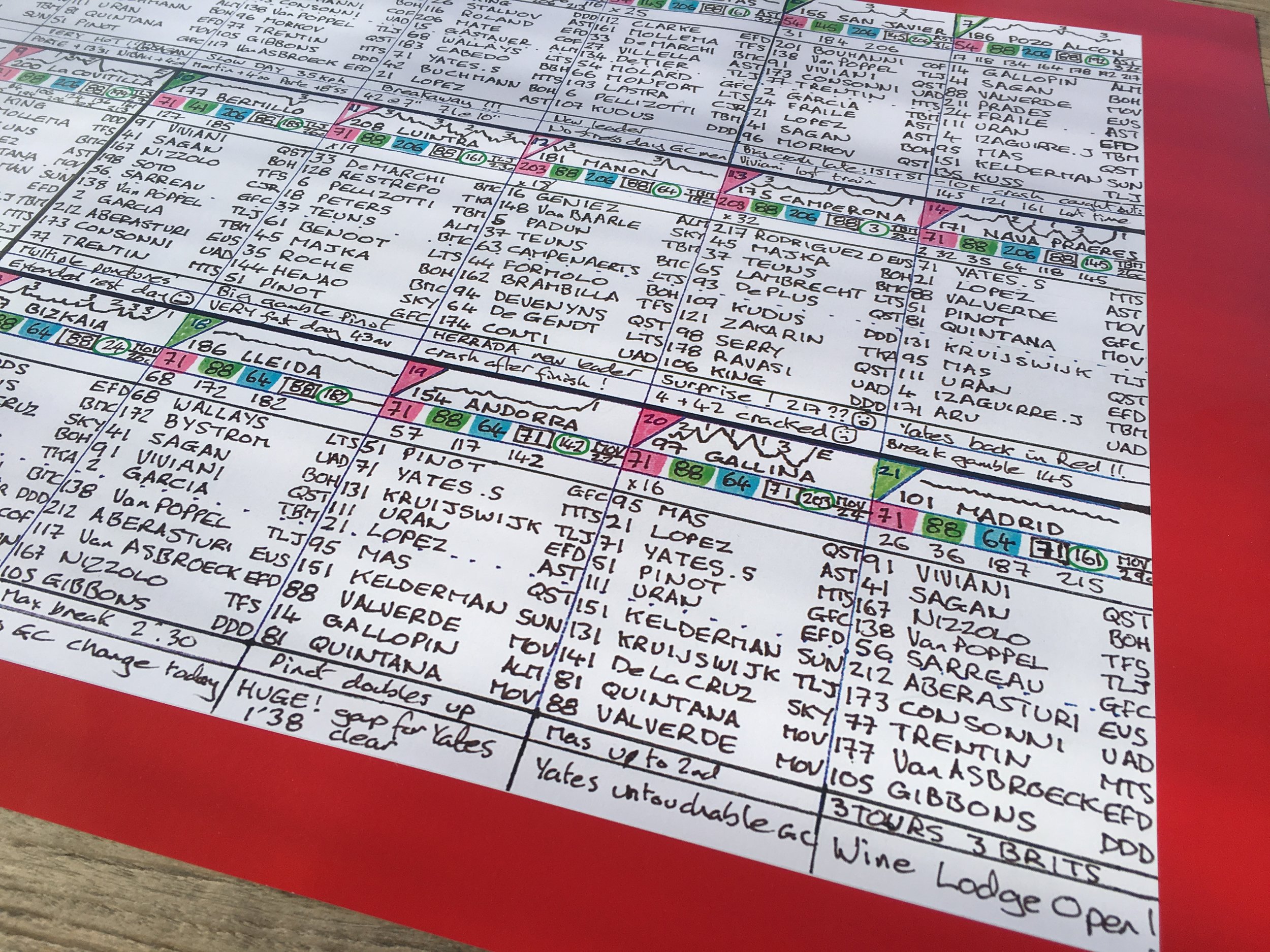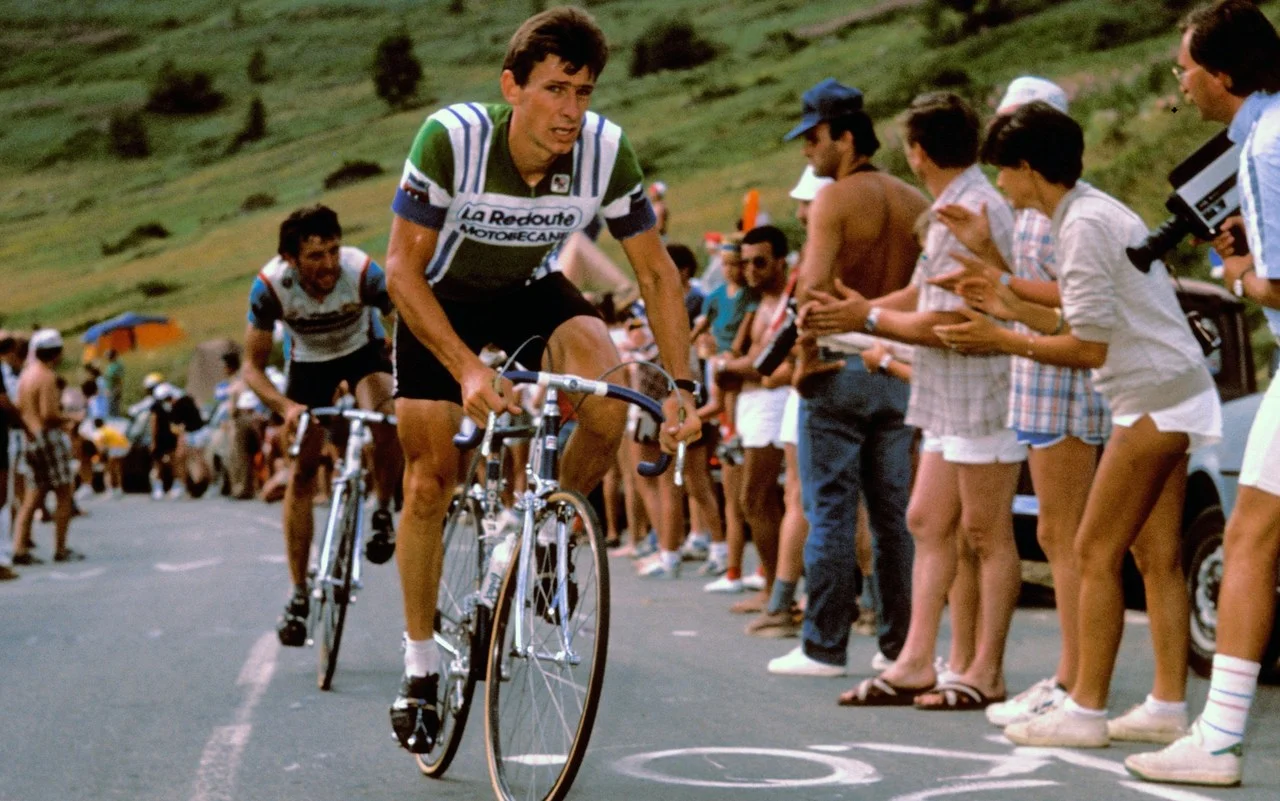Hundreds of friends, colleagues and fans attended a memorial service at Manchester Cathedral last week in honour of cycling commentator and bike racer, Paul Sherwen.
Paul Sherwen in his La Redoute kit on the cobbles
Sherwen, best known for his broadcast work on the Tour de France with Phil Liggett for over 30 years, died suddenly of heart failure at his home in Uganda just before Christmas aged only 62.
His death prompted an outpouring of grief, with Phil Liggett saying that he received over 10,000 messages of support and condolence on Twitter when the news became public.
To many, he along with Liggett, were the voices of cycling and they were responsible for a whole generation’s passion and interest in the sport which, back in the 1980s, remained a fringe and somewhat exotic minority interest. Bringing the Tour de France to a new British audience, the pair were able to explain the intricacies and minutiae of the Grand Tours. Their enthusiasm and excitement for the sport was catching and helped it to grow exponentially in the UK as their welcoming approach ushered in thousands of new fans.
The Phil and Paul Show
With a 10 year career as a professional bike racer and with seven Tour de Frances under his belt, he initially began as an analyst, but fast became a co-commentator in his own right. A Francophile through and through, having spent many years racing for a French team on the continent, he became known for his descriptions of the French countryside and chateaux along the course.
Meanwhile his language skills which included Swahili were renowned. His French was full of slang terms picked up in the ‘Foreign Legion Academy’ of the peloton, and his French colleagues would become dismayed that he could complete their native crosswords quicker than they.
Liggett describes their relationship as the perfect couple – like Morecambe and Wise and Laurel and Hardy their two names, Phil and Paul, will forever be inextricably linked. What’s more their success defined what cycling commentary still is to this day.
As affable, upbeat and cheerful as he was in the commentary booth and in company, Sherwen was as hard as nails when it came to bike racing. Despite his ironic nickname of ‘The Climber’, he was in fact neither climber or sprinter, but displayed an aggressive style on the bike.
‘The Climber’
On the 1983 Tour he crashed early on and had to endure six hours riding solo with the prospect of arriving at the finish line outside of the time cut. He rolled in 23 minutes too late, but the organizers reinstated him - a testament to the high esteem in which they held him.
That toughness was garnered from the many long rides he endured through the cold and rain on training rides through the Peak District in the early days when he was a student at Manchester University. He was renowned for forsaking gloves in the coldest of weather and would set a brutal pace at the front of the group.
In the 1970s, a barren decade for British cycling, he was one of only four English speaking professional riders on the continent. But he paved the way for a flux of followers like Sean Yates, John Heraty, Stephen Roche, Alan Piper and Phil Anderson, all of whom he mentored and supported as they tried and succeeded to break into the top ranks of the peloton.
It’s surely significant that, in over 10 years of riding at the top level, he raced for only two teams. Directeur Sportifs loved his commitment, loyalty and cheerful demeanour as well as that afore-mentioned toughness.
Ian Boswell, now at Katusha Alpecin, has also commented that he was a brilliant DS himself when he briefly took the reins at Raleigh Banana after retiring. He was a fantastic manager and ran the operation like a modern, efficient team, something of a novelty for many riders with experience on the continent.
Filming in his beloved Africa
Sherwen was very much an international. He returned to live in Uganda where he had spent his early childhood (his father was a manager of a factory there), and he was passionate about both the wildlife and the people. He is remembered as a bit of an Indiana Jones character, tramping across the plains, going on safari and even owning a gold mine.
He worked tirelessly to improve the lives of East Africans, driven by a belief in the need for Africa to become self-sustaining in terms of its workforce and industrial capacity. To find out more about his humanitarian legacy, you can read about his efforts in an article by Joe Harris in VeloNews.
Phil Liggett recently wrote about how he will now cope with “the empty chair to my left…deep down Paul will be there with me. He’ll be alongside me for the rest of my career. I just wish he knew how loved he was.”
RIP Paul Sherwen, 1956 – 2018
You can watch a video of the full memorial service here.


































